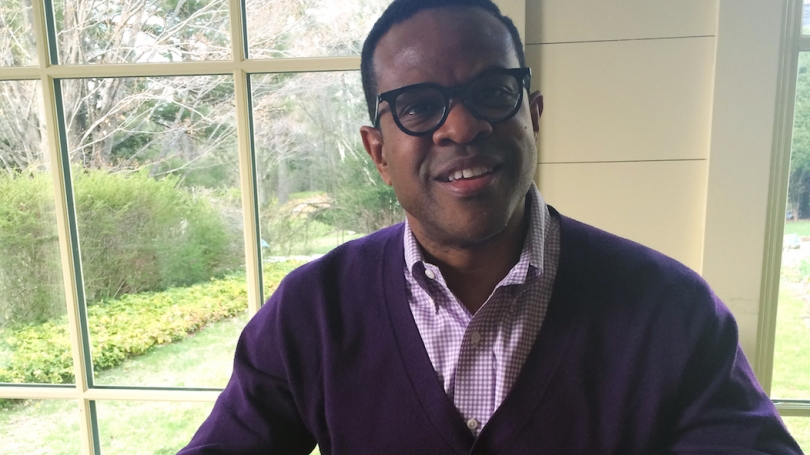
Thomas Allen Harris explains the narrative aspect of the project in the Baker-Berry library installation (Photo by Preetha Sebastian)
For the past few weeks, award-winning filmmaker and Montgomery Fellow Thomas Allen Harris has been spending time at Dartmouth. And he’s made it a point to keep busy. Besides having intimate conversations with graduate students over lunch at the Montgomery House and teaching an undergraduate class every week, Harris’s experimental project, Digital Diaspora Family Reunion (DDFR), has created his own unique platform for interaction with the Dartmouth community.
The Forum caught up with Harris at the Montgomery House, where he is in residence as a Montgomery Fellow this term, to talk about the philosophy behind his work, his experiences at Dartmouth, the DDFR project, and events he has planned for the community.
Harris invites the community for the screening of his Peabody Award-finalist documentary film, Through A Lens Darkly: Black Photographers and the Emergence of a Black People, at the Hopkins Centre for the Arts on Thursday, May 5 at 7 pm. The film is the first to explore the American family photo album, bringing memorable stories and images to the fore. The film success was also the motivation behind Harris taking up the larger DDFR project.
While this film focuses on the family landscape of African Americans, Harris wants to expand the narrative to transcend community lines. He tells us that his goal is to create an album that embodies the theme of “One World, One Family”, which is the driving force behind the DDFR project.
[thomas-allen-harris-forum-may2016-thumb]
Thomas Allen Harris explains the narrative aspect of the project in the Baker-Berry library installation (Photo by Preetha Sebastian)
“I want to change society’s general perception of people. I don’t want people to be looked at first as an Indian, East Indian, or African American men and women, but instead to be looked at as someone’s daughter or son, sister or brother, mother or father, or even an aunt or uncle,” Harris told The Forum.
Besides bringing the image of a united family in society, the filmmaker calls for a breaking out of racialized categories. “Someone could also be seen as a student, a teacher, or a journalist. I wish for people to stop being viewed by their race with the ‘us versus them’ type of notion,” the filmmaker added.
While referring to a conversation he had over lunch with graduate students, Harris pointed how the discussion asserted how a change in the mentality of racial stereotyping gives way for people to reveal their uniquely individual narratives, bring out the nuances of cultures and depict diversities within their countries.
Speaking about his inspiration behind continuing to collect photographs and accompanying family narratives, Harris said, “I hope to be able to open people’s hearts, not just their eyes.”
The filmmaker holds “roadshows” in the public sphere on a regular basis to bring in diverse narratives and has even planned a roadshow at Dartmouth to bring in the diverse stories of the community. Harris pointed out that through each roadshow, which is inherently unique and diverse, a sense of unity is fostered even among strangers.
“Somebody starts talking about a photograph and the narrative behind it, and this can trigger a similar narrative in other people present and creates an almost domino effect,” the filmmaker told The Forum.
During these roadshows a common thread emerges, which Harris says allows for the weaving of a larger, more intricate narrative. “My idea for the DDFR platform is for new narratives to emerge and draw people in from different generations as well as ethnicities,” Harris said.
He has already started adding photographs and stories from the Dartmouth community to an already existing body of over 16,000 images and 1,000 interviews. To do this, the filmmaker set up a camera in the Baker-Berry library and welcomed people to share their family photographs and the stories behind them.
On his philosophy of filmmaking, which he pointed out was unique in that it is experimental and crowd sourced, Harris said, “My focus is on constructing with my films by using the rich archives we have, incorporating history and personal stories, rather than destructing.”
The filmmaker invites the Dartmouth community to watch his film and share their family histories through photographs at the roadshow and to use the DDFR public Faceboook group to tell their story. To stay tuned to Harris latest projects and developments with the DDFR project, follow him on Facebook and Twitter.